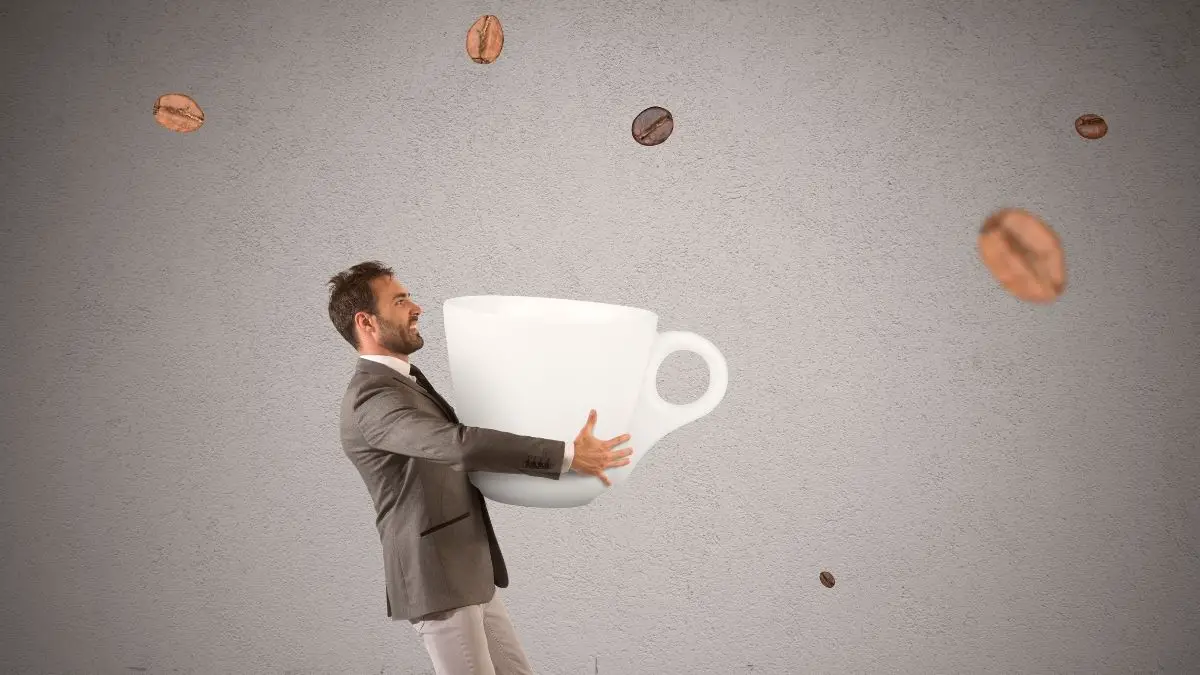Will you give up your favorite cup(s) of coffee? We know it would be difficult, and we certainly understand that. No one wants to give it up. But when dizziness sets in, what will you do?
A cup of regular brewed coffee contains about 95 mg of caffeine, which is enough for you to get the day started. Health experts suggest that healthy adults can take up to 400 mg of caffeine a day, which is equivalent to four cups of brewed coffee. However, as a stimulant that affects the human central nervous system, too much intake can make you dizzy.
Luckily, there are many ways how to get rid of coffee jitters or even avoid them after having your favorite cup of coffee. And that’s what we’re going to find out here.
How To Get Rid Of Coffee Jitters
A good rule of thumb is to take caffeine according to what you can manage. Not that you’ll have to exceed 400 mg a day, but if you’re just trying to get your day started, a cup or two would be great.
It’s worthy to note that caffeine takes itself out of your system. So, you may have to wait for it to go away, but if you feel sick after having your cup, take these few tips to feel better.
- Stop the caffeine for the day. Yes, obviously, you don’t need more caffeine intake for the day if you feel dizzy, nauseous, or if your head already hurts. And don’t think about chocolates too. It’s not a good idea apparently.
- Flush it out with water. One of the best ways to get rid of dizziness after having your coffee is to drink plenty of water. Caffeine can produce a mild diuretic effect on coffee drinkers that cause frequent restroom visits. Although it doesn’t cause severe dehydration, too much coffee can make you feel dehydrated and water is anything but great help.
- Take a deep breath. Caffeine can also cause you to palpitate and feel anxious. If it happens, practice good breathing exercises to keep your nerves calm and breathe normally. If possible, do it without any distractions and play soothing music to make you feel relaxed.
- Go and take a walk. If you feel like your energy is holding you back, it’s best to take a walk. Sometimes, it’s great to get those feet moving when you feel dizzy. However, if the jitters are too exhausting, just stop walking and take a deep breath. You don’t need to exhaust yourself.
- Replace the lost electrolytes. Caffeine can also upset your stomach that causes you to go to the restroom frequently, which means you’re also losing electrolytes. If you do, you can take some electrolyte replacement or rehydration drinks like Pedialyte.
- Drink some herbal tea. The effects of caffeine can be neutralized through sipping on herbal teas like Chamomile. Not that herbal teas only give you good digestion and other health benefits, but they can also help balance your body’s caffeine content.
- Stretch it out. Exercising has been proven and tested when it comes to healthy living. And if you do it when you feel lightheaded after having a cup of coffee, it can help a lot. Do some stretching or go jog outside. You know when to stop when you feel already exhausted.
- Wait until it goes away. Many people notice that the effects of caffeine intake normally go away at least after a couple of hours. If you can, stay still and do some meditation or as we suggested above, take a deep breath and don’t forget to infuse a lot of water to wash it out.
- Vitamin C is key. If you’re a coffee lover and can’t get enough of it each day, you will need to gear up your body with Vitamin C. Too much caffeine intake can affect the abundance of vitamin C concentration in your bloodstream. If you’re not into vitamin capsules, get fresh fruits like oranges, strawberries, mango, among others.
- Stock up on foods rich in fiber. If you consume food that digests slowly and is packed with fiber, it can help wash out the caffeine content in your body. Foods like nuts, beans, seeds, lentils, whole grains, and starchy vegetables are the best options.
Effects Of Too Much Caffeine Intake
High caffeine levels in your body don’t just cause dizziness.
Caffeine can also cause:
- anxiety
- shortness of breath
- sweating
- nausea
- headache
- increased heartbeat
- sleeping trouble
- nervousness
- shakiness
- restlessness
- increased blood pressure
- acid reflux
- vertigo
Although caffeine overdose is rare, others would even suffer from it with:
- chest pain
- fever
- severe dehydration
- vomiting
- unmanageable muscle movement
- unstable breathing
What Is Caffeine?
Caffeine is naturally found in seeds, leaves, and some fruits and trees as an insect repellant and herbicide. Cocoa beans, tea leaves, coffee beans, kola nuts, yerba mate, and guarana are packed with caffeine. These are among the ingredients used in your caffeinated food and drinks, including your favorite hot or cold-brewed coffee.
Caffeine is considered a psychoactive drug and is unregulated and legal worldwide. It’s a stimulant that increases or affects your brain and central nervous system’s activity. For the most part, caffeine is best when consumed in moderation.
According to Food and Drug Administration (FDA), healthy adults can manage up to 400 mg of caffeine intake each day. This should not exceed as it can cause adverse health effects. For pregnant women, it’s recommended to take only up to 200 mg of caffeine per day. Too much intake can cause low birth weight, miscarriage, or preterm birth.
Children’s developmental progress may also be affected when there are high caffeine levels in their bloodstream. Teenagers, on the other hand, should limit their caffeine intake per day to avoid any adverse effects.
Caffeinated Food And Beverages
Apart from your favorite cup of brewed coffee, there are many other food and drinks that are also caffeinated. Right. It’s not just coffee that gets the caffeine. Foods like chocolates or chewing gums are also caffeinated.
Let’s check some of these caffeinated foods and drinks, and how they affect your health if anything.
- Chocolate and Cocoa Beans. Any food that’s chocolate-flavored contains caffeine, although the amount varies depending on how much cocoa the food has. The top 10 list of brands below has the highest caffeine content among the 100+ popular chocolate makers.
- Semi-sweet Chocolate Chips. It contains 105 mg of caffeine per serving.
- Dark Chocolate-coated Coffee Beans. It gives you a whopping 336 mg of caffeine per serving of about 28 beans.
- Milk Chocolate-coated Coffee Beans. It has 227 mg per serving.
- Scharffen Berger Mocha Bar. It contains 59 mg.
- Scharffen Berger Extra Dark Chocolate Bar. This gives 42 mg of caffeine.
- Dagoba Eclipse Extra Dark Chocolate. It has 41 mg of caffeine per 1.5 oz of serving.
- Dagoba New Moon Dark Chocolate. It gives 34 mg of caffeine per serving.
- Scharffen Berger Semi-sweet Chunks, and Bittersweet Chocolate Bar. Both contain 33 mg of caffeine.
- Hershey’s Special Dark Chocolate Bar. Per serving of about 41 g, this contains 31 mg of caffeine.
- Dark Chocolate. It contains 26 mg of caffeine per 28.4 g of serving.
- Decaffeinated Coffee. Despite that it’s called decaf, it still contains caffeine but with a smaller amount compared to regular coffee beverages. For a cup of decaf coffee, for instance, the caffeine content is between 1 and 50 mg depending on the serving and the brand itself. A study suggested that decaf coffee helps reduce the risk of type 2 diabetes.
- Kola Nut. It’s a staple to food culture in West Africa and used to be the main ingredient and source of caffeine in Coca-Cola. Kola nut is sourced from the kola tree, which contains natural caffeine. It’s also used as a food additive and can be consumed dried or fresh.
- Green Tea. This has amazing health benefits and is widely consumed in most parts of the world, especially in Asia. About 240 ml of green tea contains between 30 and 50 mg of caffeine.
- Guarana. In the Amazon forest in Brazil, you can find the guarana plant, which is packed with antioxidants and also a stimulant. Its extract is used in making energy bars, sodas, and herbal supplements.
- Yerba Mate. Also known as Paraguay Tea, this is made from dried, crushed leaves of the tree called Ilex paraguariensis. It’s a natural source of caffeine and offers health benefits. Every 240 ml of yerba mate tea has 20 to 180 mg of caffeine.
- Chewing Gum. While this is popular among children too, chewing gum has about 50 mg of caffeine depending on the brand itself. It’s made from tree sap and is also a natural source of caffeine.
The Bottom Line
Drinking too much coffee can make you dizzy, and might cause vertigo, anxiety, and other adverse health effects. While it’s fine to consume caffeine of up to 400 mg per day, it’s still important to consider how it affects your daily activity.
Coffee feels good in our bodies when it’s consumed in moderation. It fuels energy to get us started for the day, but you are in control of your caffeine intake. A cup of two a day is already awesome!

